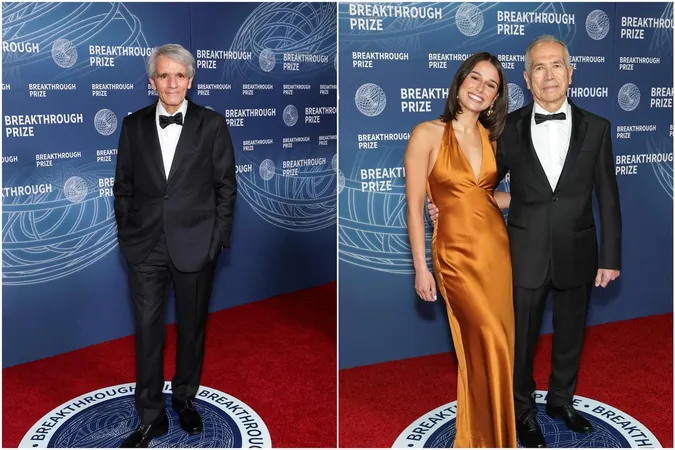
Groundbreaking Research on Multiple Sclerosis Receives the 'Oscars of Science' Recognition
2025-04-06
Author: Siti
Introduction
In a remarkable achievement for the field of neurology, Dr. Stephen Hauser from the United States and Dr. Alberto Ascherio from Italy were awarded the prestigious Breakthrough Prize on April 5. Often referred to as the "Oscars of science," this honor recognizes their transformative contributions to the understanding and treatment of multiple sclerosis (MS), a debilitating neurodegenerative disease that affects nearly three million people across the globe.
Dr. Hauser's Journey
Dr. Hauser's journey with MS research began over 45 years ago after he encountered a young, gifted attorney named Andrea, who was working at the White House under President Jimmy Carter. Dr. Hauser vividly recalls her rapid decline due to MS, which left her unable to speak, paralyzed on one side of her body, and battling severe complications. It was this poignant experience that ignited his passion for advancing MS research.
Early Challenges
Back then, treatments for MS were virtually non-existent, and skepticism permeated the scientific community regarding the possibility of finding effective therapies. MS is characterized by the immune system mistakenly attacking the central nervous system, leading to a range of cognitive and motor impairments. For years, researchers believed that T cells were mainly responsible for the disease's devastation. However, Dr. Hauser challenged this narrative and turned his focus to another type of immune cell known as B cells.
Breakthrough Discoveries
Despite being dismissed by the U.S. federal research body as "biologically implausible," Dr. Hauser and his team persevered. Their partnership with pharmaceutical company Genentech bore fruit in 2006 when they unveiled groundbreaking results: treatments aimed at targeting B cells resulted in over a 90% reduction in brain inflammation, a significant breakthrough that paved the way for new therapies that could slow the progression of MS in numerous patients.
Dr. Ascherio's Investigation
The quest to understand why MS occurs continued, with Dr. Ascherio examining the geographical patterns of the disease. He noted an intriguing correlation: MS is particularly prevalent in northern hemisphere countries, while it remains rare in tropical regions. This observation prompted Dr. Ascherio to investigate the potential role of viral infections in MS.
Epstein-Barr Virus Connection
His extensive research spanning nearly two decades culminated in a pivotal finding in 2022, which revealed a critical link between MS and the Epstein-Barr virus (EBV). While not everyone infected with EBV develops MS, every MS patient examined had previously contracted this virus. Though this discovery does not fully elucidate the mechanisms behind MS, it opened new avenues for potential treatments and preventive strategies for a disease that remains incurable.
Future Implications
Furthermore, Dr. Ascherio's findings could have implications beyond MS, as his team is now researching the intersection of viral infections and other neurodegenerative disorders, including Alzheimer's disease and amyotrophic lateral sclerosis (ALS), popularly known as Lou Gehrig's disease.
Conclusion
The award received by Dr. Hauser and Dr. Ascherio shines a spotlight on the ongoing battle against MS and the tireless dedication of researchers working to unlock the mysteries of this complex disease. As the scientific community builds on their findings, hope grows for the development of more effective treatments and perhaps a path toward prevention, igniting optimism for millions affected by this challenging condition.



 Brasil (PT)
Brasil (PT)
 Canada (EN)
Canada (EN)
 Chile (ES)
Chile (ES)
 Česko (CS)
Česko (CS)
 대한민국 (KO)
대한민국 (KO)
 España (ES)
España (ES)
 France (FR)
France (FR)
 Hong Kong (EN)
Hong Kong (EN)
 Italia (IT)
Italia (IT)
 日本 (JA)
日本 (JA)
 Magyarország (HU)
Magyarország (HU)
 Norge (NO)
Norge (NO)
 Polska (PL)
Polska (PL)
 Schweiz (DE)
Schweiz (DE)
 Singapore (EN)
Singapore (EN)
 Sverige (SV)
Sverige (SV)
 Suomi (FI)
Suomi (FI)
 Türkiye (TR)
Türkiye (TR)
 الإمارات العربية المتحدة (AR)
الإمارات العربية المتحدة (AR)